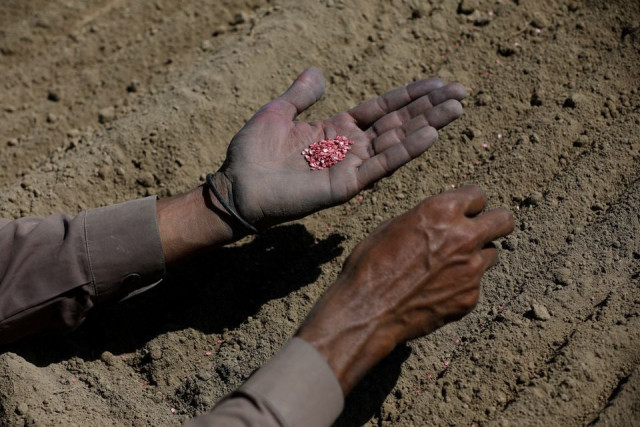Seeds worth Rs50b imported annually
Official announces launch of MIS to monitor production

The country needs to produce quality seeds for reducing an annual import bill of Rs50 billion to help boost the economy and see the farmers prosper, Federal Seed Certification and Registration Department Director General Azam Khan has stressed.
Addressing a seminar, he said the government had allowed the private sector to prepare the basic seeds for reducing the import bill, which would also help achieve the objective of agricultural development and food security in the country.
He said the launching of a management information system (MIS) would help increase the capacity of seed companies and ensure monitoring by the regulator of the companies so that the farmers get certified seeds.
Khan said suggestions of the companies would be considered to completely activate the Seed Track and Trace System.
The department’s directors Nazar Iqbal and Hayyat Ullah Tareen said the MIS had been introduced so that certified seed would be monitored at every stage and sale of substandard seeds should be discouraged.
Seed Association of Pakistan (SAP) president Rana Salman Mehmood and General Secretary Bilal Gujjar said the system would be good for the seed companies and it would be implemented in stages so that it could work properly.
They demanded that Rahim Yar Khan be declared a ‘seed district’ because 70 per cent of the national production originated there.
It was reported on these pages in the month of March this year that the country’s corporate sector had joined hands to fix the agricultural sector by doubling cotton production in a pilot project and increasing rice exports from the current level of around $2.5 billion a year.
The corporate sector had established electronic warehouses to control post-harvest losses, conduct proper grading of crops, develop brands and step up exports.
Banks, insurance firms, fertiliser manufacturers and food companies, among others, have assembled under the umbrella of the Pakistan Agricultural Coalition (PAC). It is offering solutions to the crippling agricultural sector as Pakistan is an agriculture-based economy.
"Pakistan is the agricultural superpower. However, it has fallen sick," remarked PAC Strategy Adviser Kazim Saeed during a media briefing.
Saeed said, “Pakistan is a giant cotton producer and ranks eighth in wheat harvest out of 120 wheat-producing countries across the world.”
Pakistan produces three major crops namely wheat, paddy (rice) and maize worth a total of $12 billion a year. However, it bears post-harvest losses of $1 billion (slightly over 8%) owing to the lack of a suitable storage capacity and supply chain issues, he had said.
"It is a must to fix the agricultural sector to achieve food security, ensure import substitution, and increase exports of cotton, textile and rice."
Pakistan had achieved a record high cotton production of around 15 million bales in 2014-15 but since then production has remained on the wane.
Cotton harvest is estimated to stay below 5 million bales in the current season (FY23).
Consequently, the country is compelled to import cotton worth around $2 billion this year to meet the need of the export-focused textile industry. Textile is the largest export sector that fetches 60% of total export proceeds.
PAC has designed a programme to establish Pakistan’s first world-class cotton seed company to provide farmers with high-germination, high-yielding, highly pure and highly pest and insect-resistant cotton seeds.
“These varieties...have achieved double the germination levels of existing varieties in the market and have nearly 100% purity. Their commercial-scale cultivation started in 2021 over 40,000 acres of land and reached 80,000 acres in 2022,” said Saeed.
Published in The Express Tribune, August 28th, 2023.



















COMMENTS
Comments are moderated and generally will be posted if they are on-topic and not abusive.
For more information, please see our Comments FAQ